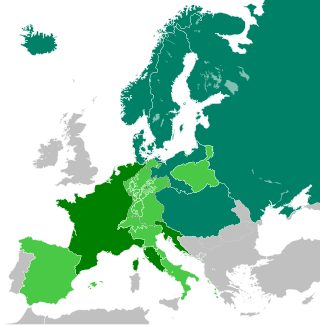Related Research Articles
Continental drift is the theory, originating in the early 20th century, that Earth's continents move or drift relative to each other over geologic time. The theory of continental drift has since been validated and incorporated into the science of plate tectonics, which studies the movement of the continents as they ride on plates of the Earth's lithosphere.

Plate tectonics is the scientific theory that Earth's lithosphere comprises a number of large tectonic plates, which have been slowly moving since 3–4 billion years ago. The model builds on the concept of continental drift, an idea developed during the first decades of the 20th century. Plate tectonics came to be accepted by geoscientists after seafloor spreading was validated in the mid-to-late 1960s. The processes that result in plates and shape Earth's crust are called tectonics. Tectonic plates also occur in other planets and moons.

The Royal Navy (RN) is the naval warfare force of the United Kingdom, British Overseas Territories and Crown Dependencies, and a component of His Majesty's Naval Service. Although warships were used by English and Scottish kings from the early medieval period, the first major maritime engagements were fought in the Hundred Years' War against France. The modern Royal Navy traces its origins to the English Navy of the early 16th century; the oldest of the UK's armed services, it is consequently known as the Senior Service.

The United Nations Convention on the Law of the Sea (UNCLOS), also called the Law of the Sea Convention or the Law of the Sea Treaty, is an international treaty that establishes a legal framework for all marine and maritime activities. As of October 2024, 169 sovereign states and the European Union are parties.

The Continental Blockade, or Continental System, was a large-scale embargo by French emperor Napoleon I against the British Empire from 21 November 1806 until 11 April 1814, during the Napoleonic Wars. Napoleon issued the Berlin Decree on 21 November 1806 in response to the naval blockade of the French coasts enacted by the British government on 16 May 1806. The embargo was applied intermittently, ending on 11 April 1814 after Napoleon's first abdication.

A continental shelf is a portion of a continent that is submerged under an area of relatively shallow water, known as a shelf sea. Much of these shelves were exposed by drops in sea level during glacial periods. The shelf surrounding an island is known as an insular shelf.

The Continental Navy was the navy of the Thirteen Colonies during the American Revolutionary War. Founded on October 13, 1775, the fleet developed into a substantial force throughout the Revolutionary War, owing partially to the efforts of naval patrons within the Continental Congress. These congressional patrons included the likes of John Adams, who served as the chairman of the Naval Committee until 1776, when Commodore Esek Hopkins received instruction from the Continental Congress to assume command of the force.

Commander Abraham Whipple was an American naval officer best known for his service in the Continental Navy during the Revolutionary War and being one of the founders of Marietta, Ohio. Born near Providence, Colony of Rhode Island, Whipple chose to be a seafarer early in his life and embarked on a career in the lucrative trade with the West Indies, working for Moses and John Brown. In the French and Indian War period, he became a privateersman and commanded privateer Game Cock from 1759 to 1760. In one six-month cruise, he captured 23 French ships.

Isaac Chauncey was a United States Navy officer who served in the Quasi-War, the Barbary Wars and the War of 1812. In the latter part of his naval career he was President of the Board of Navy Commissioners.

Law of the sea is a body of international law governing the rights and duties of states in maritime environments. It concerns matters such as navigational rights, sea mineral claims, and coastal waters jurisdiction. The connotation of ocean law is somewhat broader, but the law of the sea is so comprehensive that it covers all areas of ocean law as well.

The Penobscot Expedition was a 44-ship American naval armada during the Revolutionary War assembled by the Provincial Congress of the Province of Massachusetts Bay. The flotilla of 19 warships and 25 support vessels sailed from Boston on July 19, 1779, for the upper Penobscot Bay in the District of Maine carrying an expeditionary force of more than 1,000 American colonial marines and militiamen. Also included was a 100-man artillery detachment under the command of Lt. Colonel Paul Revere.

John Manley (c.1733–1793) was an officer in the Continental Navy and the United States Navy. Manley was appointed commodore of "George Washington's fleet."

The Jomsvikings were a legendary order of Viking mercenaries or conquerors of the 10th and 11th centuries. Though reputed to be staunchly dedicated to the worship of the Old Norse gods, they would allegedly fight for any lord who could pay their substantial fees, even if they may be Christian. The institution of the Jomsvikings would itself foreshadow those of the later religious and chivalric orders of the Middle Ages.

James L. Nelson is an American historical nautical novelist.

The history of the United States Marine Corps (USMC) begins with the founding of the Continental Marines on 10 November 1775 to conduct ship-to-ship fighting, provide shipboard security and discipline enforcement, and assist in landing forces. Its mission evolved with changing military doctrine and foreign policy of the United States. Owing to the availability of Marine forces at sea, the United States Marine Corps has served in nearly every conflict in United States history. It attained prominence when its theories and practice of amphibious warfare proved prescient, and ultimately formed a cornerstone of U.S. strategy in the Pacific Theater of World War II. By the early 20th century, the Marine Corps would become one of the dominant theorists and practitioners of amphibious warfare. Its ability to rapidly respond on short notice to expeditionary crises has made and continues to make it an important tool for U.S. foreign policy.

The Brave Express Might Gaine is an anime television series begun in 1993, created by Takara and Sunrise under the direction of Shinji Takamatsu, and was the fourth in the Yūsha or Brave metaseries.
William Day was a Springfield, Massachusetts, sea captain who acted against America's enemies in both the French and Indian War and the American Revolutionary War. In 1777 he received the first gun salute to an American fighting vessel in a European port.
The arms race between Great Britain and Germany that occurred from the last decade of the nineteenth century until the advent of World War I in 1914 was one of the intertwined causes of that conflict. While based in a bilateral relationship that had worsened over many decades, the arms race began with a plan by German Admiral Alfred von Tirpitz in 1897 to create a fleet in being to force Britain to make diplomatic concessions; Tirpitz did not expect the Imperial German Navy to defeat the Royal Navy.

Paul Dudley Sargent was a privateer and soldier in the Continental Army during the American Revolutionary War.

Warfare in early modern Scotland includes all forms of military activity in Scotland or by Scottish forces, between the adoption of new ideas of the Renaissance in the early sixteenth century and the military defeat of the Jacobite movement in the mid-eighteenth century.
References
- ↑ "Isaac Biddlecomb Series".
- ↑ Folsom, Chandra Niles. Revolution at Sea. The Hour, August 20, 1999, p B2.
- ↑ "By Force of Arms on Goodreads".
- ↑ "The Maddest Idea on Goodreads".
- ↑ "The Continental Risque on Goodreads".
- ↑ "Lords of the Ocean on Goodreads".
- ↑ "All the Brave Fellows on Goodreads".
- ↑ "The French Prize on Goodreads".
- ↑ "John Fitzgerald".
- ↑ Review: The Continental Risque Publishers Weekly
- ↑ Review: By Force of Arms Publishers Weekly
- ↑ Wilde, Diana. Revolution sea story charged with energy, action, history. Bangor Daily News, April 7, 2000, p G2.
- ↑ Smith, Sandy. U.S. Navy saga has wide appeal. Lodi News-Sentinel, December 1st 2001, p 3.